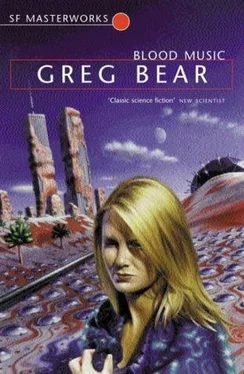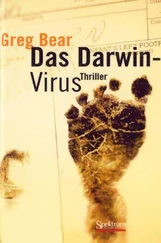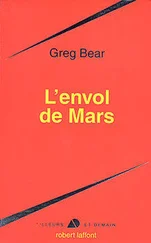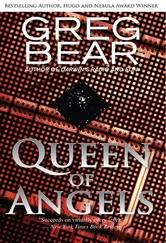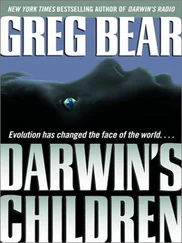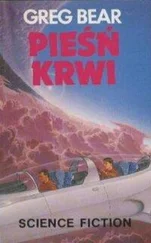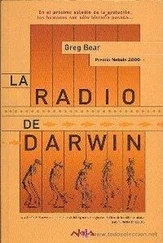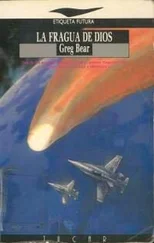“It’s crazy,” she said. “It doesn’t mean a thing. Nothing’s happening because it doesn’t make sense.”
She rolled away from the cubicles, up against the far windows. The rest of the floor seemed clear—no crumpled clothing. Seen from across the floor, the cubicles resembled aquariums filled with exotic sea creatures.
Maybe she was safe. Usually whatever was in an aquarium didn’t come out. She tried to convince herself she was safe, but it really didn’t matter. For the moment, there wasn’t anywhere else she could go.
Her knee was swelling, straining her jeans. She thought about cutting the jeans open, and then decided it was best simply to slide out of them. With a grunt, she let herself down from the stool and leaned back against a filing cabinet. Lifting her hips, balancing on one leg, she humped and bunched the jeans carefully past the swelling.
It wasn’t very ugly yet, just puffy and purpling under the kneecap. She poked it and felt faint, not from pain, but simply because she was drained. There was nothing left of Suzy McKenzie now. The old world had gone first, until nothing remained but buildings, which without people were like skeletons without flesh. New flesh was moving in to cover the skeletons. Soon the old Suzy McKenzie would be gone, too, leaving nothing but a quizzical shadow.
She turned her face north, around the edge of the cabinet and over a low credenza.
There was the new Manhattan, a tent city with skyscrapers for poles; a city made of toy blocks with the blocks rearranged under blankets. Glowing warm mellow brown and yellow in the sunset. Newer York, filled with empty clothes.
Old Suzy dropped back on the carpet, cradled her head in her arms and pushed her hauntingly empty jeans under her knee to elevate it “When I awake,” she told herself, “I will be a Wonder Woman, shiny and bright. And I will know what’s happening.”
Down deep, however, she understood she would wake up normal enough, and the world would be the same.
“Not a good deal,” she murmured.
In the dark, filaments grew silently over the carpet, reaching into the glass cubicles, subduing the buoyant creativity within.
—Ibelong to nobody. I am not what I once was. I have no past. I am cut loose and there is really nowhere to go but where they wish to take me.
—I am separated from the outside world physically, and now mentally.
—My work is done here.
—I am waiting.
—I am waiting.
Truly, you WISH to journey among us, be among us?
—I do.
He stares at the red and green and blue on the VDT. The figures lose all meaning for the moment as if he is a newborn child. Then the screen, the table it rests on, the lavatory curtain beyond and the walls of the containment chamber are replaced by a silvery null.
Michael Bernard is crossing an interface.
He is encoded.
No longer conscious of all the sensations of being in a body. No more automatic listenings and responses to the slide of muscles past one another, the bubbling of fluids in the abdomen, the push and roar of blood and pounding of the heart. He no longer balances, tenses or relaxes. It is like suddenly moving from the city into the heart of a quiet cave.
At first, thought itself is grainy, discontinuous. If such a thing can be, he visualizes himself at the very basement of the universe, where all the atoms and molecules combine and separate, making silent noises at each other like scuttling shellfish on the bottom of the sea. He is suspended in silent, jerking activity, unable to critique his situation or even to be sure what he is. Part of his faculties are temporarily cut off. Then—jerk! He can critique, evaluate. Thought moves like a dissociation of leaves across a lawn in a breeze. Jerk! Now, like a sluggish flow of gelatin circling and setting up in a cold bowl.
Bernard’s journey has not even begun yet He is still caught in the interface, not big, not small. There is part of him still relying on his universe-sized brain, still pushing thought along cells instead of within cells.
The suspension becomes a drawn-out unconsciousness, thought pulled like a thread to fit a tiny needle’s
eye—————————
——————————————————
————————————————
——————————————
————————————
——————————
————————
——————
—————
————
——
—
The small bursts upon him and his world is suddenly filled with action and simplicity. There is no light, but there is sound. It fills him in great sluggish waves, not heard but felt through his hundred cells. The cells pulse, separate, contract according to the rush of fluid. He is in his own blood. He can taste the presence of the cells making up his new being, and of cells not directly part of him. He can feel the rasping of microtubules propelling his cytoplasm. What is most remarkable, he can feel—indeed, it is the ground of all sensation-the cytoplasm itself.
This is now the basis of his being, the flow and electric sensation of pure life. He is aware of the knife-edge chemical balance between animation and dead jelly, with its roots in order , hierarchy, interaction. Cooperation. He is individual and, at the same time, he is each of the fellows of his team, the other hundred-cell clusters downstream and upstream. The downstream companions are as distant, as chemically isolated as if they were at the bottom of a deep well; the upstream companions are intense, rich.
He can no more puzzle the mechanisms of his thought than he could in his universe-sized brain. Thought rises above the chemistry, the interchanges within his cluster and die processes within his cells. Thought is the combination, the language of all interaction.
Sensation along the membranes of his cells is intense. It is here that he receives, feels the aura and pressure of huge molecular messages from outside. He takes in a plasmid-like data lump, *ases* it, and pours information from it, absorbing it into his being, duplicating those parts which will be needed by others among his companions. Now the lumps come rapidly, and as he breaks and pours each one, each string of molecules a library, he finds bits and pieces of Michael Bernard returning to him.
The huge Bernard is encompassed within a tiny hundred-cell cluster. He can feel there is actually a human being on the level of the noocytes—himself.
Welcome.
—Thank you.
He senses a fellow team member as a diversity of tastes, all possible varieties of sweetness and richness. The camaraderie is overwhelming. He loves his team (how can he love anything else?). He is an integral part, in turn loved and necessary.
Abruptly, he tastes the wall of a capillary. He is part of the research team, passing on information by manufacturing nucleic acid packets. Absorbing, re-making, passing on, absorbing…
Extrude. Push through.
That is his instruction. He will leave the capillary, enter the tissue.
Leave a portion stuck out into the data flow.
He pushes between the capillary cells—support cells, not themselves noocytes—and lodges in the wall. Now he waits for data in the form of structured proteins, hormones and pheromones, nucleic acid strings, data perhaps even in the form of *tailored* cells, viruses or domesticated bacteria. He needs not only basic nutrients, easily available from the blood serum, but supplies of the enzymes which allow him to absorb and process data, to think. These enzymes are supplied by *tailored* bacteria which both manufacture and deliver.
Читать дальше
